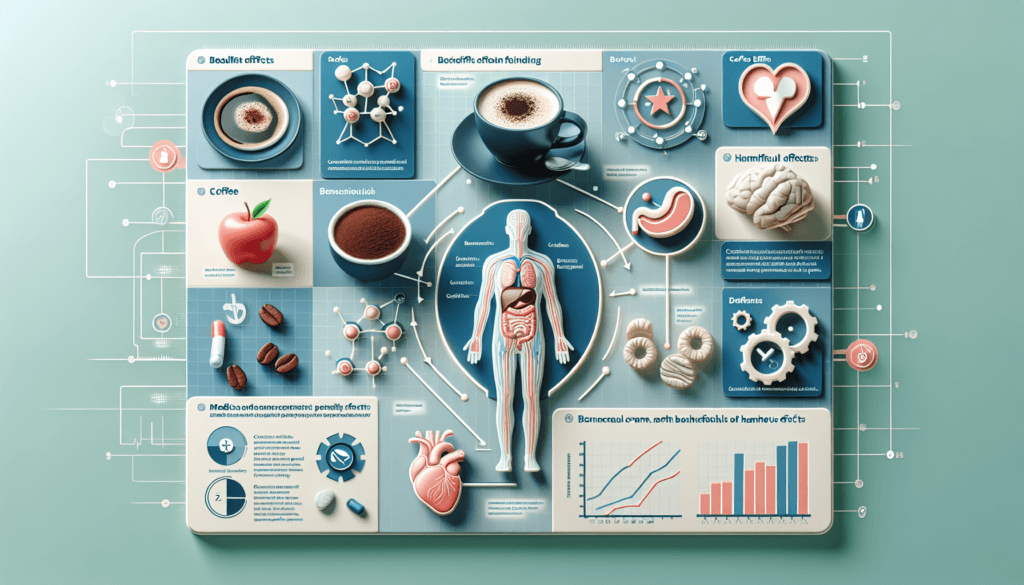You love the warm, inviting aroma of freshly brewed coffee in the morning – it’s like a comforting hug for your senses. But have you ever wondered if indulging in this delightful habit is actually good for your health? Well, get ready for a pleasant surprise because it turns out that drinking coffee can actually have some unexpected health benefits. From boosting your energy levels to protecting against certain diseases, the humble cup of joe might just be your new favorite health elixir. So, grab your favorite mug and let’s find out why drinking coffee might be one of the healthiest habits you can have.
Potential health benefits of coffee
Reduced risk of type 2 diabetes
Drinking coffee has been linked to a reduced risk of developing type 2 diabetes. Several studies have found that regular coffee consumption is associated with a lower incidence of this chronic condition. The exact mechanisms behind this relationship are not fully understood, but it is believed that certain compounds found in coffee, such as chlorogenic acid and quinides, may help improve insulin sensitivity and regulate blood sugar levels.
Lower risk of Parkinson’s disease
Research suggests that coffee drinkers may have a lower risk of developing Parkinson’s disease compared to non-coffee drinkers. The caffeine present in coffee is thought to play a role in this protective effect by stimulating dopamine production in the brain. Dopamine is a neurotransmitter that is involved in movement and is particularly affected in Parkinson’s disease.
Protection against liver disease
Regular coffee consumption has been associated with a reduced risk of liver diseases such as liver cancer, cirrhosis, and non-alcoholic fatty liver disease. The antioxidants and other bioactive compounds in coffee are believed to have a protective effect on the liver by reducing inflammation and oxidative stress. However, it is important to note that excessive alcohol consumption can negate these benefits and increase the risk of liver disease.
Improved mental alertness
One of the most well-known effects of coffee is its ability to enhance mental alertness and improve focus. The caffeine in coffee acts as a stimulant, blocking the effects of adenosine, a neurotransmitter that promotes sleep and relaxation. By inhibiting adenosine, coffee can make you feel more awake and alert, which can be particularly beneficial in the morning or during periods of prolonged cognitive tasks.
Enhanced physical performance
Coffee has also been found to have positive effects on physical performance. The caffeine in coffee can increase adrenaline levels in the blood, leading to greater activation of the fight-or-flight response. This can result in increased endurance, improved muscle contraction, and enhanced overall physical performance. Studies have shown that consuming coffee before exercise can improve performance and help individuals exercise for longer periods.
Cautions and considerations
Negative effects on sleep
While coffee can provide a much-needed energy boost, it is important to be mindful of its potential negative effects on sleep. The stimulating effects of caffeine can interfere with your ability to fall asleep and stay asleep, especially if consumed close to bedtime. To minimize sleep disturbances, it is recommended to avoid consuming coffee in the late afternoon and evening.
Increased risk of heartburn and indigestion
For some individuals, coffee can trigger heartburn and indigestion. This is due to its ability to relax the lower esophageal sphincter, a muscular ring that separates the stomach from the esophagus. When this sphincter is relaxed, stomach acid can flow back into the esophagus, causing discomfort and irritation. If you are prone to heartburn or have other digestive issues, it may be wise to moderate your coffee consumption or opt for lower acid coffee options.
Negative impact on fertility
High levels of caffeine intake, whether from coffee or other sources, have been associated with a negative impact on fertility. Research suggests that consuming more than 300 mg of caffeine per day, which is roughly equivalent to three cups of coffee, may increase the time it takes for a woman to conceive. Additionally, high caffeine intake has also been linked to an increased risk of miscarriage. If you are trying to conceive, it may be advisable to limit your coffee intake or switch to decaffeinated options.
Potential for addiction and withdrawal symptoms
Coffee contains caffeine, a natural stimulant that can be addictive. Regular consumption of coffee can lead to dependence, and sudden cessation or significant reduction in caffeine intake can cause withdrawal symptoms such as headaches, fatigue, and irritability. It is important to be mindful of your caffeine intake and consider gradually reducing your consumption if you decide to cut back or quit altogether.
Interference with nutrient absorption
Coffee, specifically the tannins and polyphenols it contains, has been found to interfere with the absorption of certain nutrients, particularly iron and calcium. These compounds can bind to these minerals, preventing their absorption in the intestines. If you rely heavily on coffee as your main source of hydration, it may be beneficial to ensure you are also consuming adequate amounts of these important nutrients from other food sources.

Coffee and heart health
Mixed findings on its impact on heart health
The relationship between coffee consumption and heart health has been a topic of debate among researchers. While some studies suggest that moderate coffee consumption may have beneficial effects on heart health, others have found associations between high coffee intake and an increased risk of cardiovascular events. It is important to note that individual responses to coffee can vary, and factors such as genetics and underlying health conditions can influence how coffee affects heart health.
Effect of coffee on blood pressure
Caffeine, the main active compound in coffee, has been shown to temporarily increase blood pressure. However, this effect is usually mild and short-lasting, and regular coffee consumption does not appear to have a significant impact on long-term blood pressure levels. It is worth noting that individuals with preexisting high blood pressure may be more sensitive to the blood pressure-raising effects of caffeine and should monitor their intake accordingly.
Coffee consumption and cardiovascular disease risk
Several studies have examined the relationship between coffee consumption and the risk of cardiovascular disease. While some have found a higher risk associated with increased coffee intake, others have reported no significant association or even a lower risk. More research is needed to better understand these complex interactions and the potential role of other factors, such as lifestyle and dietary habits, in mediating these effects.
Association between coffee and cholesterol levels
The impact of coffee on cholesterol levels is still not fully understood. Some studies have suggested that certain compounds in coffee, such as diterpenes, may raise LDL cholesterol levels (commonly referred to as “bad” cholesterol). However, other research has not found a significant association between coffee consumption and cholesterol levels. It is important to consider individual factors, such as overall diet and lifestyle, when assessing the potential impact of coffee on cholesterol.
Coffee and mental health
Potential protective effects against depression
Several studies have found an association between coffee consumption and a reduced risk of depression. The exact mechanisms behind this relationship are not well understood, but it is hypothesized that caffeine’s ability to enhance the release of neurotransmitters like dopamine and serotonin may play a role. These neurotransmitters are involved in mood regulation and can contribute to feelings of happiness and well-being.
Association with reduced risk of suicide
Research has also suggested that coffee consumption may be associated with a decreased risk of suicide. A study published in the World Journal of Biological Psychiatry found that individuals who consumed more cups of coffee per day had a lower risk of suicide compared to those who drank fewer cups. However, more research is needed to understand the underlying mechanisms and to rule out the influence of other lifestyle factors.
Impact on anxiety levels and panic attacks
Individual responses to caffeine can vary when it comes to anxiety and panic attacks. While some individuals may experience increased anxiety symptoms with coffee consumption, others may not be affected or may even find relief from symptoms. It is important to be aware of your own sensitivity to caffeine and to moderate your intake accordingly if you notice any negative effects on your mental well-being.
Role in cognitive decline and Alzheimer’s disease
Some research suggests that long-term coffee consumption may be associated with a reduced risk of cognitive decline and neurodegenerative diseases such as Alzheimer’s disease. The antioxidants and anti-inflammatory compounds in coffee are believed to have a protective effect on the brain, potentially reducing the accumulation of amyloid plaques and neurofibrillary tangles that are characteristic of Alzheimer’s disease. However, more studies are needed to establish a definitive link and to determine optimal coffee consumption for these potential benefits.

Coffee and cancer
Mixed evidence on its association with cancer risk
The association between coffee consumption and cancer risk has been the subject of numerous studies, and the findings have been mixed. Some meta-analyses have suggested a protective effect of coffee against certain types of cancer, while others have found an increased risk. It is important to note that most studies have focused on specific types of cancer, and more research is needed to provide a comprehensive understanding of the relationship between coffee and cancer.
Possible protective effects against certain types of cancer
Research suggests that coffee may have protective effects against liver and colorectal cancer. The antioxidants and anti-inflammatory properties of coffee may help reduce the risk of these cancers by suppressing inflammation and oxidative stress. However, it is crucial to maintain a balanced and healthy lifestyle, including a varied diet, regular exercise, and avoidance of other risk factors, to maximize cancer prevention efforts.
Increased risk of bladder cancer
Some studies have found a positive association between coffee consumption and an increased risk of bladder cancer. The exact mechanisms behind this relationship are not fully understood, and it is unclear whether it is solely attributable to coffee or other lifestyle factors commonly associated with coffee consumption, such as smoking. If you have a family history of bladder cancer or other risk factors, it may be prudent to discuss your coffee consumption with a healthcare professional.
Relationship with breast and prostate cancer
The relationship between coffee consumption and breast and prostate cancer is still inconclusive. While some studies have suggested a lower risk of these cancers with higher coffee intake, others have not found a significant association. It is essential to consider individual factors and lifestyle choices when assessing the potential impact of coffee on breast and prostate cancer risk.
Coffee and weight management
Effect of caffeine on metabolism
Caffeine, the major active compound in coffee, has been shown to increase metabolic rate and fat oxidation. This means that consuming coffee can temporarily boost calorie burning and may help individuals maintain a healthy weight. However, the magnitude of these effects is relatively modest, and coffee should not be relied upon as a sole weight loss strategy.
Coffee consumption and appetite suppression
Coffee has been found to have appetite-suppressing effects, which can contribute to weight management. The caffeine in coffee can act as an appetite suppressant by reducing feelings of hunger and increasing feelings of fullness. However, this effect may not be sustainable in the long term, and it is important to listen to your body’s hunger cues and ensure you are nourishing yourself adequately with a balanced diet.
Potential benefits for weight loss and control
When consumed as part of a balanced diet and lifestyle, coffee can be a helpful tool for weight loss and weight management. It can provide an energy boost before exercise, enhance fat burning, and help control appetite. However, it is crucial to remember that coffee alone is not a magic solution, and healthy eating habits and regular exercise are key for sustainable weight loss and maintenance.
Considerations for adding calories from coffee additives
While coffee itself is low in calories, the add-ons like sugar, cream, or flavored syrups can significantly increase its calorie content. These additional calories can contribute to weight gain if consumed in excess. If you enjoy adding extras to your coffee, it is essential to be mindful of your overall calorie intake and choose healthier options such as unsweetened plant-based milk and natural sweeteners.

Role in oxidative stress and inflammation
Coffee as a source of antioxidants
Coffee is a rich source of antioxidants, which are compounds that help protect the body against oxidative stress. Antioxidants fight against free radicals, unstable molecules that can damage cells and contribute to chronic diseases. The antioxidants found in coffee, such as chlorogenic acid and caffeic acid, are thought to have potent protective effects in the body.
Impact on oxidative stress levels
Research has shown that coffee consumption can reduce markers of oxidative stress in the body. Regular intake of coffee has been associated with decreased levels of oxidative stress biomarkers, suggesting that coffee’s antioxidants may play a role in neutralizing harmful free radicals and reducing cellular damage. However, individual responses may vary, and more research is needed to fully understand the long-term effects on oxidative stress.
Effect on inflammation markers in the body
Chronic inflammation is a known contributor to various diseases, including cardiovascular disease, diabetes, and some types of cancer. Studies have found that coffee intake is associated with lower levels of inflammatory markers in the body. The anti-inflammatory properties of coffee’s bioactive compounds are believed to play a role in reducing inflammation and potentially mitigating the risk of chronic diseases associated with inflammation.
Role in chronic diseases associated with oxidative stress
Oxidative stress and inflammation are closely linked to the development of chronic diseases such as cardiovascular disease, neurodegenerative disorders, and certain types of cancer. The antioxidants and anti-inflammatory compounds in coffee have been studied for their potential protective effects against these diseases. However, it is important to note that coffee consumption should not be viewed as a substitute for other healthy lifestyle choices, such as a balanced diet and regular exercise, in reducing the risk of chronic diseases.
Coffee and gut health
Potential impact on gut microbiota
Emerging research suggests that coffee may have a prebiotic effect, meaning that it can promote the growth of beneficial bacteria in the gut. Certain compounds in coffee, such as soluble dietary fibers and polyphenols, are believed to stimulate the growth of beneficial gut bacteria, thus promoting a healthy gut microbiota. However, more studies are needed to fully understand the mechanisms and long-term effects on gut health.
Effect of coffee on gastrointestinal motility
Coffee is known to have a stimulating effect on the digestive system, particularly on gastrointestinal motility. The caffeine in coffee can increase contractions of the digestive muscles, potentially speeding up the transit of food through the digestive tract. While this can be beneficial for individuals struggling with constipation, it may cause digestive issues such as diarrhea in some people, especially when consumed in large quantities.
Association with digestive issues like diarrhea and acid reflux
Coffee consumption has been linked to digestive issues such as diarrhea and acid reflux in some individuals. The stimulating effects of caffeine can cause excessive contractions of the digestive muscles, leading to loose stools or an increased frequency of bowel movements. Furthermore, coffee’s acidity may exacerbate symptoms of acid reflux in individuals who are prone to this condition. If you experience these digestive issues with coffee consumption, it may be advisable to reduce your intake or switch to lower acid coffee options.
Contribution to a healthy gut environment
While individual responses may vary, moderate coffee consumption can contribute to a healthy gut environment. The prebiotic properties of coffee, combined with its stimulating effects on gastrointestinal motility, can promote regular bowel movements and help maintain gut health. However, excessive consumption or individual sensitivities may lead to digestive issues, so it is important to listen to your body and adjust your coffee intake accordingly.

Coffee and pregnancy
Caffeine’s effects on pregnancy outcomes
During pregnancy, caffeine can cross the placenta and affect the fetus. High caffeine intake has been associated with an increased risk of miscarriage, preterm birth, and low birth weight infants. To minimize these risks, healthcare professionals often advise pregnant women to limit their caffeine intake. The specific recommendations may vary, but it is generally advisable to consume no more than 200 mg of caffeine per day, which is roughly equivalent to one 12-ounce cup of coffee.
Increased risk of miscarriage and preterm birth
Several studies have found an association between high caffeine intake and an increased risk of miscarriage and preterm birth. The exact mechanisms behind these relationships are still being studied, but it is believed that caffeine’s stimulant effects on the uterus and its impact on blood flow to the placenta may play a role. To ensure a healthy pregnancy, it is crucial for expectant mothers to be mindful of their caffeine intake.
Association with low birth weight infants
High caffeine intake during pregnancy has also been linked to an increased risk of low birth weight infants. It is believed that caffeine’s effect on blood flow to the placenta and its impact on fetal growth may contribute to this association. To promote healthy fetal development and minimize the risk of low birth weight, it is advisable for pregnant women to follow the recommended guidelines for caffeine consumption.
Recommendations for pregnant women
Pregnant women are generally advised to limit their caffeine intake to 200 mg per day or less. This includes all sources of caffeine, not just coffee. It is important to be aware of the caffeine content in different beverages and foods and make informed choices accordingly. If you have concerns or questions about caffeine intake during pregnancy, it is recommended to consult with a healthcare professional for personalized guidance.
Conclusion
Coffee can offer potential health benefits when consumed in moderation and as part of a balanced lifestyle. Reduced risk of type 2 diabetes, lower risk of Parkinson’s disease, protection against liver disease, improved mental alertness, and enhanced physical performance are among the potential advantages of coffee consumption. However, it is crucial to be mindful of potential negative effects, such as interference with sleep, increased risk of heartburn and indigestion, and negative impact on fertility.
When it comes to coffee and heart health, mixed findings have emerged, with some studies suggesting beneficial effects and others indicating potential risks. Similarly, the relationship between coffee and mental health appears complex, although studies have suggested potential protective effects against depression and reduced risk of suicide. The impact of coffee on anxiety levels, panic attacks, and cognitive decline is still being investigated.
Regarding coffee and its association with cancer risk, evidence remains mixed. While some studies have suggested protective effects against certain types of cancer, an increased risk of bladder cancer has been observed in some research. Further studies are needed to provide a comprehensive understanding of this relationship and to consider individual factors when assessing coffee’s impact on cancer risk.
Coffee may play a role in weight management, with its potential effects on metabolism and appetite suppression. However, it is important to be mindful of calorie content from coffee additives and to incorporate other healthy lifestyle choices for sustainable weight loss and control. Coffee’s role in oxidative stress, inflammation, gut health, and pregnancy outcomes is still being explored, with preliminary evidence suggesting potential benefits and considerations.
In conclusion, balance and moderation are key when it comes to coffee consumption. It is important to consider individual tolerances and sensitivities, as well as consult with healthcare professionals, especially if you have underlying health conditions or specific health goals. By understanding the potential health benefits and cautions surrounding coffee, you can make informed decisions about your coffee consumption and enjoy this popular beverage in a way that suits your needs and supports your overall well-being.



